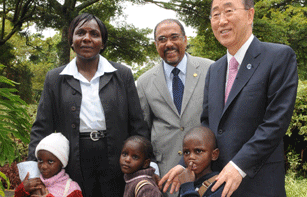
Press Release
UN Secretary-General outlines new recommendations to reach 2015 goals for AIDS response
31 March 2011 31 March 2011In lead-up to June High Level Meeting, progress report presents overview of efforts needed to help countries achieve universal access to HIV services and zero new HIV infections, discrimination and AIDS-related deaths

Launch of the Report of the Secretary-General. Nairobi, Kenya, 31 March 2011.
Credit: UNAIDS/AFP - S.Maina
NAIROBI, 31 March 2011—Thirty years into the AIDS epidemic, investments in the AIDS response are yielding results, according to a new report released today by United Nations Secretary-General Ban Ki-moon. Titled Uniting for universal access: towards zero new HIV infections, zero discrimination and zero AIDS-related deaths, the report highlights that the global rate of new HIV infections is declining, treatment access is expanding and the world has made significant strides in reducing HIV transmission from mother to child.
Between 2001 and 2009, the rate of new HIV infections in 33 countries—including 22 in sub-Saharan Africa—fell by at least 25%. By the end of 2010, more than 6 million people were on antiretroviral treatment in low- and middle-income countries. And for the first time, in 2009, global coverage of services to prevent mother-to-child transmission of HIV exceeded 50%.
But despite the recent achievements, the report underscores that the gains are fragile. For every person who starts antiretroviral treatment, two people become newly infected with HIV. Every day 7 000 people are newly infected, including 1 000 children. Weak national infrastructures, financing shortfalls and discrimination against vulnerable populations are among the factors that continue to impede access to HIV prevention, treatment, care and support services.
The Secretary-General’s report, based on data submitted by 182 countries, provides five key recommendations that will be reviewed by global leaders at a UN General Assembly High Level Meeting on AIDS, 8–10 June 2011.
“World leaders have a unique opportunity at this critical moment to evaluate achievements and gaps in the global AIDS response,” said Secretary-General Ban Ki-moon at the press briefing in the Kenyan capital. “We must take bold decisions that will dramatically transform the AIDS response and help us move towards an HIV-free generation.”

United Nations Secretary-General Ban Ki-moon and UNAIDS Executive Director Michel Sidibé with Rebecca Auma Awiti, mother of three children and field coordinator with the non-governmental organization Women Fighting AIDS in Kenya who told her story at the press conference.
Credit: UNAIDS/AFP - S.Maina
“Thirty years into the epidemic, it is imperative for us to re-energise the response today for success in the years ahead,” said UNAIDS Executive Director Michel Sidibé, who joined Mr Ban for the launch of the report. “Gains in HIV prevention and antiretroviral treatment are significant, but we need to do more to stop people from becoming infected—an HIV prevention revolution is needed now more than ever.”
Rebecca Auma Awiti, a mother living with HIV and field coordinator with the non-governmental organization Women Fighting AIDS in Kenya told her story at the press conference. “Thanks to the universal access movement, my three children were born HIV-free and I am able to see them grow up because of treatment access,” she said.
Mobilizing for impact
In the report there are five recommendations made by the UN Secretary-General to strengthen the AIDS response:
- Harness the energy of young people for an HIV prevention revolution;
- Revitalize the push towards achieving universal access to HIV prevention, treatment, care and support by 2015;
- Work with countries to make HIV programmes more cost effective, efficient and sustainable;
- Promote the health, human rights and dignity of women and girls; and
- Ensure mutual accountability in the AIDS response to translate commitments into action.
The Secretary-General calls upon all stakeholders to support the recommendations in the report and use them to work towards realizing six global targets:
- Reduce by 50% the sexual transmission of HIV—including among key populations, such as young people, men who have sex with men, in the context of sex work; and prevent all new HIV infections as a result of injecting drug use;
- Eliminate HIV transmission from mother to child;
- Reduce by 50% tuberculosis deaths in people living with HIV;
- Ensure HIV treatment for 13 million people;
- Reduce by 50% the number of countries with HIV-related restrictions on entry, stay and residence; and
- Ensure equal access to education for children orphaned and made vulnerable by AIDS.
As international funding for HIV assistance declined for the first time in 2009, the report encourages countries to prioritize funding for HIV programmes, including low- and middle-income countries that have the ability to cover their own HIV-related costs. It also stresses the importance of shared responsibility and accountability to ensure the AIDS response has sufficient resources for the coming years.
The report and more information about the High Level Meeting on AIDS can be found online at: unaids.org/en/aboutunaids/unitednationsdeclarationsandgoals/2011highlevelmeetingonaids/
Contact
UNAIDS GenevaSophie Barton-Knott
tel. +41 22 791 1697
bartonknotts@unaids.org
UNAIDS Nairobi
Saira Stewart
tel. +41 79 467 2013
stewarts@unaids.org
UNAIDS Nairobi
Esther Gathiri-Kimotho
tel. +254 20 762 6718
gathirikimothoe@unaids.org
UN Department of Public Information New York
Vikram Sura
tel. +1 212 963 8274
sura@un.org
UN Department of Public Information New York
Pragati Pascale
tel. +1 212 963 6870
pascale@un.org
External links
External links
Press centre
Download the printable version (PDF)
